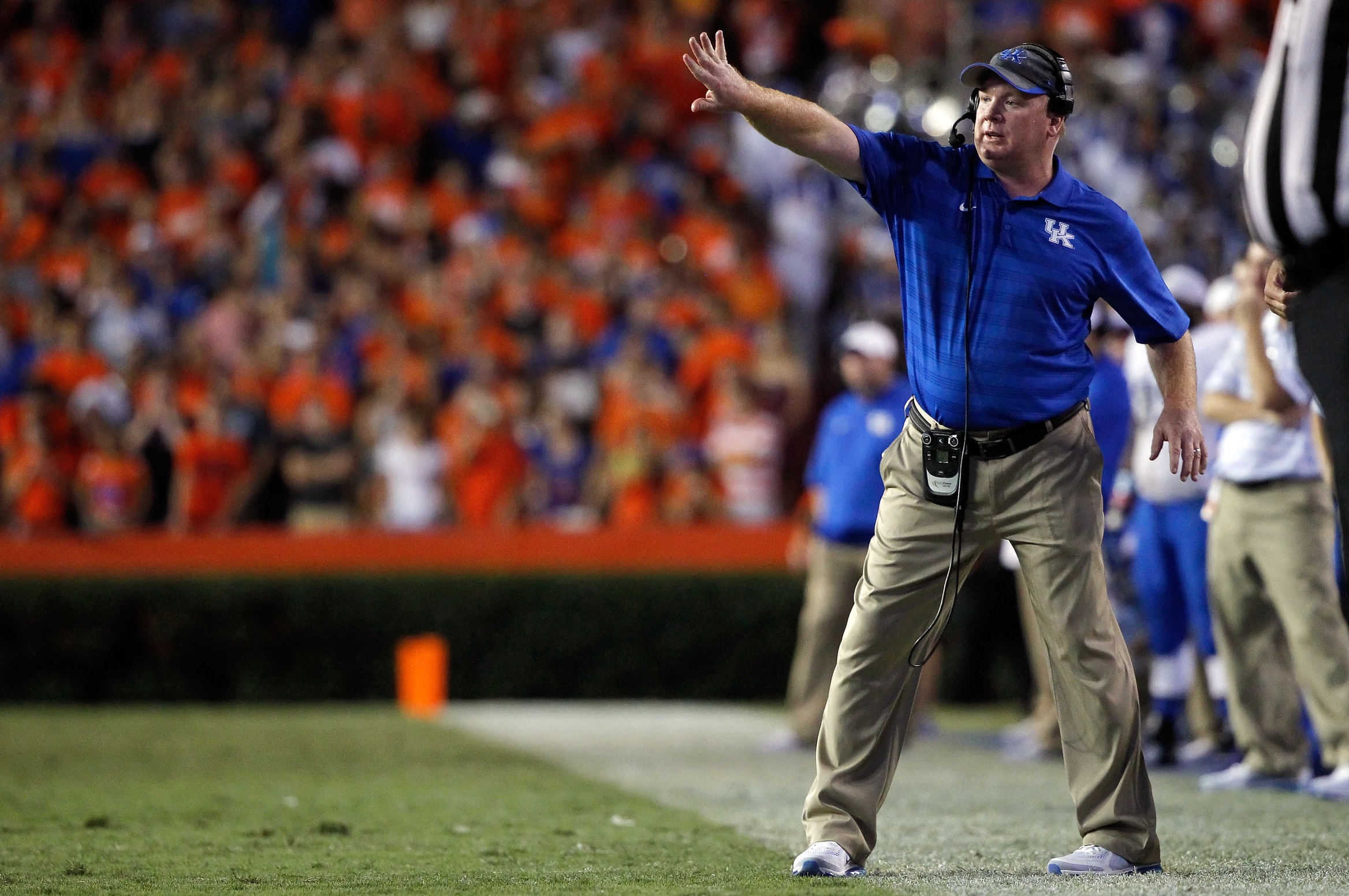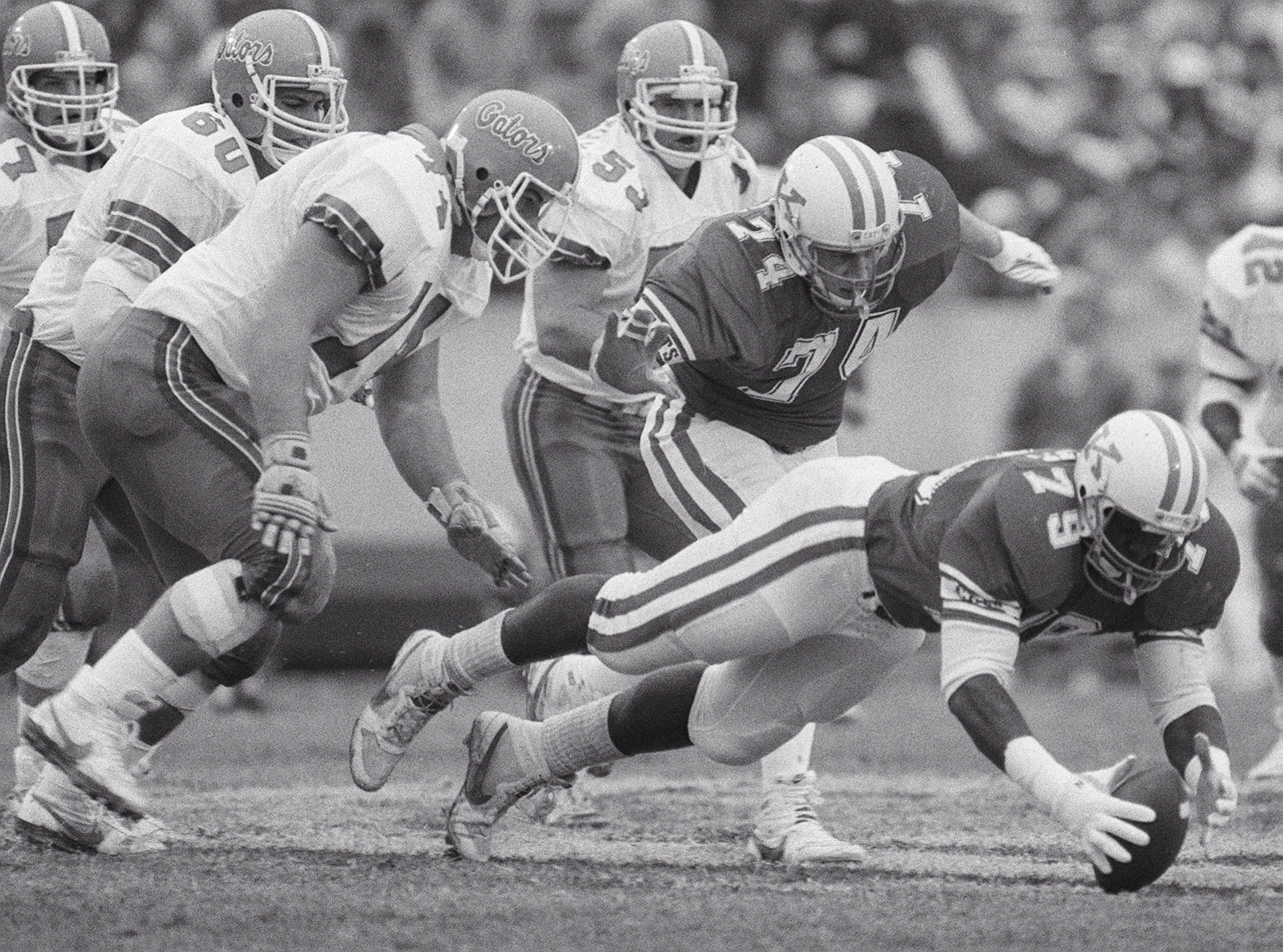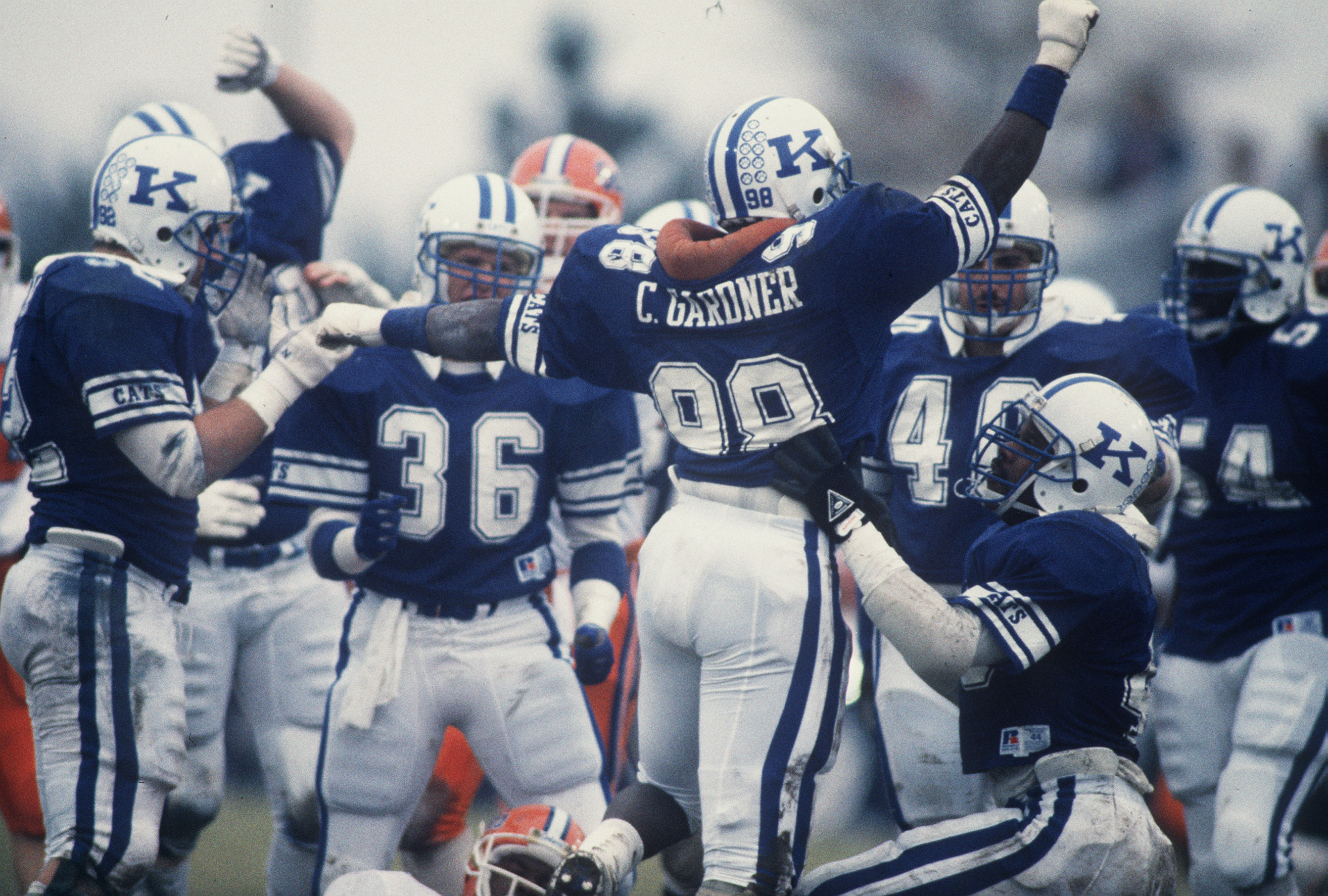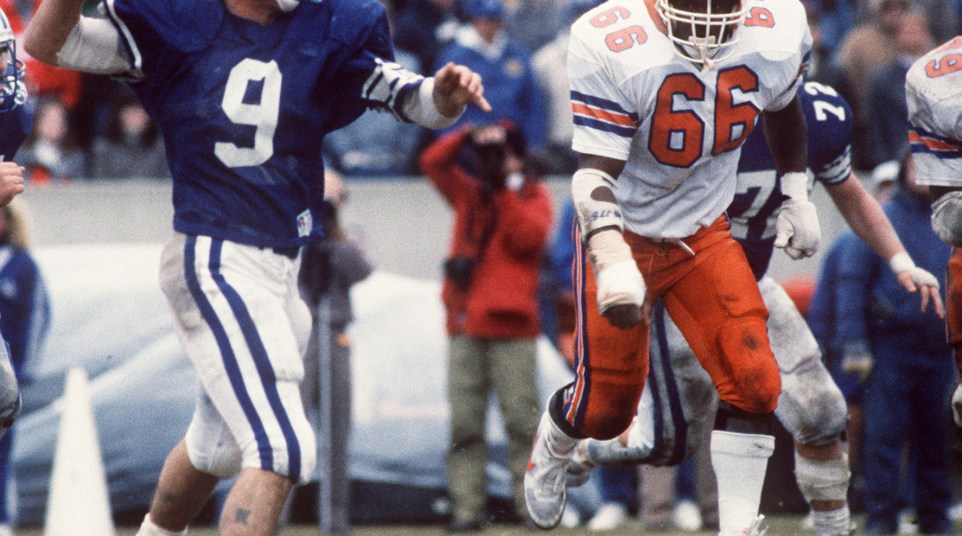Kentucky legends Bill Ransdell, Mark Higgs frustrated by Florida streak
Kentucky travels to Florida in Week 2, hoping desperately to break one of the most dubious streaks the SEC has ever seen.
The Wildcats haven’t beaten the Gators since 1986. That’s 29 consecutive losses in arguably the most lopsided annual series showcased by the conference. If UK falls to UF on Saturday, we’re talking three full decades.
Fourth-year coach Mark Stoops and Co. have been close recently. Two years ago in Gainesville, they took Florida to triple overtime before falling 36-30. Last season in Lexington, they mounted a fourth-quarter comeback that came up just short, 14-9. The gap in talent between the two programs has been more narrow than usual.
With second-year coach Jim McElwain rebuilding the Gators, a curse-breaking victory would cool Stoops’s seat considerably.
“Each and every season, each team is totally different from another,” Stoops said Wednesday on the league’s weekly coaches teleconference. “The fact that we played Florida well the past two games, the fact that we played them well two years ago when we went down there means nothing to us.”

Credit: Kim Klement-USA TODAY Sports
Not only could a win over Florida save a coach, but it could save a program. It’s impossible for the ‘Cats to avoid all the streak talk this week. However, stopping it won’t be a part of Stoops’s motivation tactics.
“We’re not worried about the last 30 years,” he said.
Coming off back-to-back 5-7 campaigns, Stoops presumably must take Kentucky bowling in order to buy himself some legitimate job security. That goal went from reasonable to questionable already in Week 1, as the Wildcats blew a 35-10 first-half lead to Southern Miss — at home, mind you — and lost in shocking fashion 44-35.
Big Blue Nation started counting down the days to Big Blue Madness following that disaster. Basketball season can’t come fast enough.
“It’s obviously out there,” McElwain said when asked about the streak during the teleconference. “That’s the great thing about sports. There’s always something to make of every event. And at the same time, both of these teams that are coming in here to play, these teams haven’t played each other. It’s 0-0.”
‘somehow, some way’
Back in 1986, Kentucky also was on the wrong side of a long losing streak. Florida had beaten the Wildcats six consecutive times.
Similarly, UK got close the year before. If not for a dropped interception on what turned out to be the game-winning drive for the Gators, the ‘Cats would have triumphed 13-12. Instead, UF prevailed with a late field goal 15-13.
Things finally turned around the following year.
Senior quarterback Bill Ransdell put together a fine performance, completing 20-of-23 passes — that was a school-record completion percentage of 86.9 — for 161 yards. He may not have thrown a touchdown, but he didn’t commit a turnover, either. Junior running back Mark Higgs was credited with 95 yards and a TD on 27 bruising carries.
Kentucky held a 10-3 lead in the fourth quarter, but UF’s Kerwin Bell started to heat up significantly on his final drive.
Taking possession at his own 17-yard line, first Bell found Eric Hodges along the sideline for 17 yards. On the next play, he connected with Darrell Woulard for 15 more. The collective feeling at Commonwealth Stadium was “here we go again.”

Credit: University of Kentucky Athletics
One snap later, Bell found Ricky Nattiel — an All-SEC selection who went on to play six years with the Denver Broncos — over the middle at the Wilcats’ 21. He averaged 17.8 yards per catch during his orange-and-blue career, so big plays were his thing.
The 5-foot-9, 180-pounder had begun to accelerate. But Nattiel never saw senior defensive back Tony Mayes, who knocked the ball loose from behind, pounced on the fumble and ended the threat.
Everywhere but the final score, the ‘Cats dominated the game. They had more first downs, 20 to 9. They had more rushing yards, 147 to 96. They had more passing yards, 161 to 145. Their time-of-possession advantage was an incredible 41:02 to 18:58.
However, this was UF. While Kentucky owned the series early, Florida began taking control in 1967. The Wildcats weren’t supposed to beat the Gators in football anymore. The Bluegrass State is known for horse racing, bourbon and, of course, basketball. The Sunshine State, on the other hand, is all about beaches, oranges and, needless to say, football.
Alligators, too.
“I’m a positive thinker,” Kentucky coach Jerry Claiborne said after the game, according to the Lexington Herald-Leader. “I thought we were going to win — somehow, some way.”
‘… as long as you beat Florida’
When Ransdell helped Kentucky break that losing streak to Florida in 1986, a measly six years felt like an eternity at the time.
Twenty-nine tries later, no Wildcat starting quarterback has beaten the Gators since. Tim Couch, Jared Lorenzen and Andre Woodson, the three most accomplished passers in UK history statistically, went a combined 0-9.
“There’s nothing positive to any kind of streak like that with us at this point,” Ransdell told Saturday Down South. “I think it would have been better after the first year or second year, quite frankly.”
Unlike Ransdell, who merely had a cup of coffee with the Indianapolis Colts, Higgs played eight seasons in the NFL. Originally drafted by the Dallas Cowboys, he also spent time with the Philadelphia Eagles, Miami Dolphins and Arizona Cardinals. He had most of his success in Miami, rushing for 2,648 yards and 14 TDs.
That being said, Higgs was a legend at Owensboro High School in Kentucky. His heart will always be with Big Blue Nation.

Credit: University of Kentucky Athletics
“It’s frustrating because when we won, it felt great,” Higgs said. “That was years ago, and I thought that was something that was going to happen over and over. But as time went by, I’ve seen years and years, coaches and coaches. We still haven’t beaten Florida.”
All this time later, Higgs remains the fourth-leading rusher in UK lore. He keeps up with the program to this day. His number was retired in 1997, and then he was inducted into the school’s Hall of Fame in 2005.
“When I first met Stoops, I said, ‘Hey, I don’t care who else you beat as long as you beat Florida,'” he said.
Higgs continues to make his home in South Florida, as his time there with the Dolphins helped him become a pillar of the community. He deals with Gator fans regularly — many of them former teammates. Every year about this time, during the buildup to another installment of Florida-Kentucky, he’s reminded of the streak.
“We beat them in basketball, but football is different,” he said. “This is a football state.”
John Crist is the senior writer for Saturday Down South, a member of the FWAA and a voter for the Heisman Trophy. Send him an e-mail, like him on Facebook or follow him on Twitter.

